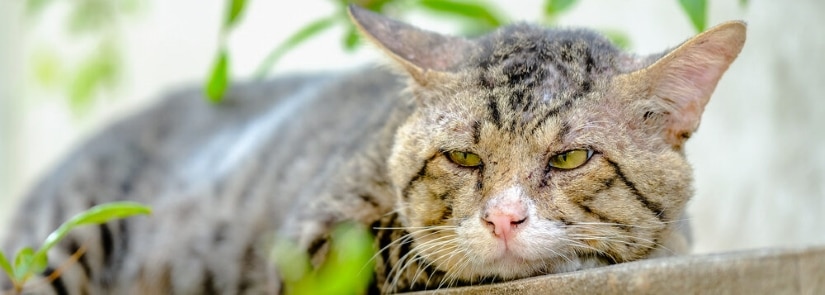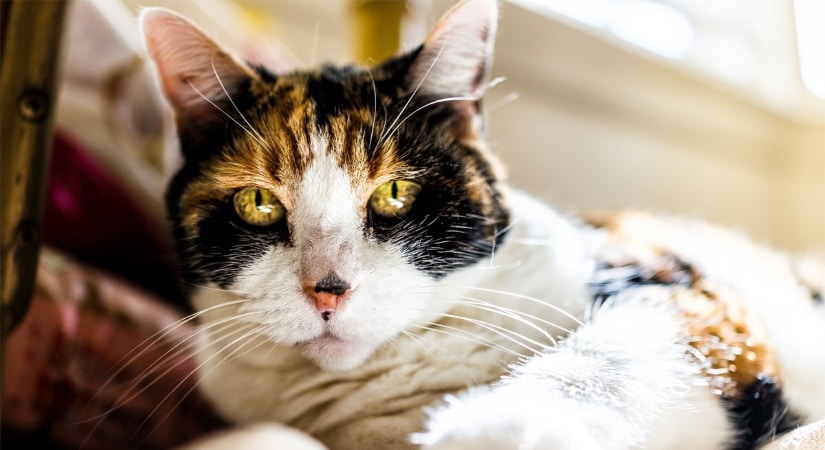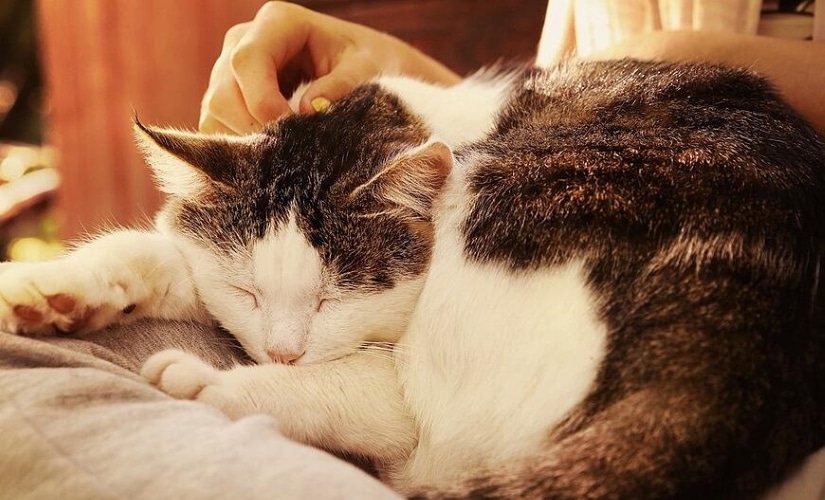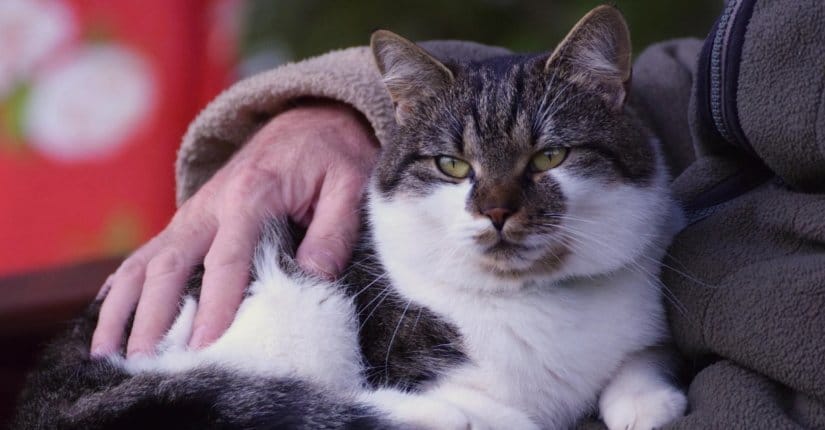When adult cats become seniors, it does not necessarily mean that they will become ill more frequently. Thanks to advances in veterinary medicine, improved nutritional cat formulas, and living indoors, cats are now considered seniors at around 12 to 14 years of age. Because you’re most familiar with your adult cat more than anyone else, you’ll need to watch for subtle signs of illness and dental issues as well.
Regular Veterinary Care
We all understand the importance of regular veterinary care with adult cats needing a veterinary examination at least twice a year. Geriatric cats (cats older than 8 years of age) should probably visit their veterinarian more often, since they may be prone to more dental problems, and because illness is more common in older cats. You’ll need to identify the illness sooner in older cats, so as to provide proper treatment with a diagnosis. Routine blood work needs to be done to check for kidney and liver disease.
Common Illnesses in Senior Cats
Senior cats may be prone to certain health conditions like the following:
- Chronic Renal Kidney Disease: This affects older cats with symptoms like excessive thirst, a larger urine volume, vomiting, weight loss, and lack of appetite.
- Diabetes Mellitus is common in older cats, and results in increased blood glucose. Weight gain and being sedentary contribute to diabetes in senior cats. Aggressive treatment when diabetes is first diagnosed allows for a good come in senior cats. Insulin injections may be necessary for your older cat’s entire life is aggressive treatment is not successful.
- Hypertrophic Cardiomyopathy: This is a heart muscle disorder where the heart walls of the left ventricle thicken. This results in the walls becoming stiffer. This is a common primary heart disease in cats. It tends to get noticed at around 3 months to 17 years of age. Most cats will be middle aged when this disorder occurs. This disorder tends to affect males more than females, and it is an inherited genetic defect.
Symptoms may include difficulty breathing, weakness or paralysis of the hind limbs. Fluid may also accumulate in the lungs, and in the space between the lungs and chest wall. Veterinary treatment will aim at improving cardiac function, and reducing blood clots. There is a good long-term outlook for mildly affected cats. Consult with your veterinarian for advice.
- Feline Cancer: Cancer is common in older cats just like in senior dogs. There are numerous types of cancer that your cat can be treated for.
Symptoms will vary according to the type of cancer your senior cat is diagnosed with. A special cancer diet is recommended for pets with cancer.
- Gingivitis: Regular dental care will reduce plaque development in older cats, which can lead to gingivitis and gum disease. With gingivitis, the gums will become inflamed because of plaque. Ligaments and bone are not yet affected. By including daily tooth brushing, dietary changes, using a plaque prevention gel, and oral rinses, you’ll be helping your cat. Consulting with your veterinarian for preventative cleanings every 3 months to save your cat’s teeth is important. Extra care needs to be given to dental care with older cats.
- Ringworm: This is an infection of the skin, hair, or claws, and is caused by a fungus called dermatophyte. This occurs in 98% of cats. It spreads easily from cats to people. Symptoms include circular, bald patches that scale and have broken hairs in a ring-like fashion. Consult with your veterinarian for advice.
- Heat Sensitivity: Cats will sweat through their foot pads. Older cats need to be kept indoors during the hot summer months. That said, senior cats need lots of fresh water to drink, cool places to lie in, and a cool home during extreme summers.
Symptoms of heat exhaustion include a fast heart rate, sunken eyes, and excessive panting. If your senior cat is obese, it will be necessary to watch closely for heat exhaustion, and to make sure that your home is kept at the correct temperature to avoid over-heating.
- Hip Dysplasia: This is rare in domestic cats, and is common in purebred cats. This occurs when the hip joint is loose, and leads to degenerative joint disease. (osteoarthritis) Symptoms include lameness that can be mild to severe. Cats generally need no surgery for hip dysplasia. Weight reduction can help reduce discomfort. Opt for orthopedic cat beds to help with comfort and support.
- Skin Disorders: Senior cats may be prone to skin disorders, and to idiopathic seborrhea. This is an inherited skin disorder resulting in the overproduction of an oily substance. This clumps in the cat’s fur, and causes it to smell bad.
Symptoms include red and irritated skin with excessive scratching. Consult your veterinarian for advice. Feeding a high-quality diet will help to keep your senior cat in tip top shape, and may also prevent obesity and cognitive decline.
Parasite Care

All cats, including older cats, will need parasite control and routine health care throughout their lives. This means vaccinating your cats throughout their lifetime This is an important part of keeping your cats healthy, and free of parasites. Consult with your veterinarian, and always consider veterinary health insurance for your cat. Special care needs to be given to the health needs of your senior cat.
Nutrition for Older Cats
Today there are numerous options for high-quality cat food formulas. Some cats may prefer a single protein, while others may prefer variety. There are also grain-free and gluten-free cat food options, as well as Kosher. Game meats are also being used for super-premium canned cat foods.
Fresh water and a high-quality diet are imperative for good feline heath in cats of all ages. This tends to be more important in older cats because kidney function tends to deteriorate as they get older.
Nutritional support takes on a more important role as your cat gets older or when he’s faced with an illness like cancer. Some diseases like cancer require different foods and different amounts of food. Consult with your veterinarian, so that you can discuss nutritional support, and pain relief, including alternate ways to providing your senior cat with comfort and care.
Avoid overfeeding cats, obesity and overworking a cat’s digestive system occurs. When underfeeding, numerous other health concerns occur. If in doubt, consult with your veterinarian for advice on how much to feed your senior cat.
How Many Times a Day Should I Feed My Senior Cat?
Scheduled feedings for senior cats are preferable. A good reason for this is that so many cats are obese today. By feeding on a schedule, you’ll be able to see how much your cat is eating, and if your new cat is overweight, you’ll be able to put your cat on a diet that is supervised by your veterinarian.
The other option is free- feeding, which means leaving food out all day for cats. This works for picky eaters, since they’re able to eat throughout the day. Here are some feeding tips for your senior cats:
- Buy the very best cat food that you can afford.
- Healthy nutrition is vital for good health and a healthy and long life.
- Read up and understand feline nutrition so that you’re better able to determine which commercial foods are best.
- Always consult your veterinarian when changing diets to make sure that all your senior cat’s nutritional needs are being met. A cat’s diet will need to change as he gets older. Feeding for the correct life stage is important for longevity in senior cats.
There are grain-free and good for cats with food sensitivities or allergies. Pet parents can also opt for combination canned foods that offer salmon, chicken, duck liver, pheasant, and even fruits and veggies. Some brands offer seaweed with ocean crabmeat and tuna with a healthy gravy.
Dry cat food is a popular choice because it promotes healthier gums and teeth. Yet, wet food is more often recommended by veterinarians because it provides more moisture to cats. Look for cat treats that are higher in moisture than the norm.
Water
Cats don’t drink a lot of water, and tend to sometimes get dehydrated. Wet cat food also has its benefits. By choosing a well-known name- brand cat food that has scientific backing, as well as quality control, cat parents can be assured that they are providing a well-balanced diet.
Cat Food
All senior cat breeds need high- quality fat and protein in their diets. They also need amino acids, including taurine that cannot be found in either human food or dog food. There are also numerous specialty diets for your cat that are formulated specifically for certain medical problems like urinary tract disorder, obesity, or kidney disease.
Senior cats do well by being fed twice daily. Some cat parents prefer to leave cat kibble out 24/7. When looking for a high-quality senior cat food, here’s what to look out for:
- No low-quality fillers
- No artificial additives
- Low grade ingredients or toxic ingredients
- All cat food has to be meat-based because all cats are carnivores.
- No garlic
- Plant-based ingredients should be listed after the protein-based ingredients
Grooming Your Senior Cat

Senior or geriatric cats still need to be groomed regularly. Daily grooming helps to remove shedding hair. Older cat’s coats do well with gentle grooming, since they may have aches and pain. Curry brushes help with grooming, and will remove dead hair and debris from your cat’s coat. Grooming needs to be gentle, since all cats dislike having their fur pulled.
Grooming Products for Cats
Look for high-quality pet products to decrease shedding, and help prevent hairballs. Products like the Furminator will easily groom through your cat’s topcoat, and safely remove dead hair without hurting your cat. Soft tip massagers, deluxe nail trimmers, and de-shedding tools all help make cat grooming so much easier.
All cats, including older geriatric cats groom themselves several times throughout the day. Daily grooming is necessary because it limits the amount of hair that your cat will consume. This helps limit the development of hairballs. Your cat will enjoy being groomed.
Coat Care
Coat hair always looks best during the cold winter months. Daily cleaning with pet wipes beneath the tail is necessary. Ears should be checked weekly for cleanliness and sensitivity. If there is a build-up of wax and dirt, organisms can lead to an ear infection. Cats that have been spayed or neutered will have great coats year- round. This is because hormonal changes in cats affects coat length and thickness. Daily cleaning with pet wipes beneath the tail is necessary.
Nail Trimming
Nail trimming is necessary every few weeks. Eyes should also be cleaned gently every morning with cotton wool or a soft wipe. Each eye should be cleaned with different wipes or cotton balls to avoid eye infection contamination in both eyes.
Exercising The Older Cat
Older cats still need to play and interact with people., and should not be left alone all day. Cat gyms, cat scratchers, and interactive cat toys within a cat friendly home environment work best for older cats to keep them mentally stimulated and happy. Exercising older cats may be more challenging, yet cat parents can do so by purchasing certain cats toys to promote exercise.
Look out for the latest cat toys like Ripple rug play mats, the Feather Whirls, pet cube toys, food trees, turbo scratcher toys, cat companion interactive toys, and electronic motion toys. All these and many more will keep your older cat entertained throughout the day.
Poly Rattan weaved cat scratchers make for longer lasting cat scratching posts. They are more durable, and built to last. Hemp toys for cats are irresistible. Some come with colorful feathers and hemp cord allowing for longer playtime with your feline. Chasing, hunting, and attacking toys are some of the methods that cats will use when playing with interactive toys. When out shopping for cat toys, opt for safe TPA materials that have no toxic BPA or BHT.
Socialization

Senior cats need to be introduced to new cats gradually. Older cats may take a long time getting used to a new cat or pet in the household. Most senior cats are territorial, and may view the new cat as an intruder. Older cats should never be neglected or left alone for long periods of time.
If out at work all day, cat parents should consider getting two cats for companionship purposes. That said, your cat should never be placed in a dangerous environment or be near aggressive dogs or people.
The senior cat and new cat should meet by allowing each other to have a quick sniff of each other. This can be done through a gate separating room. After that cats should be held all the while being allowed to investigate one another. By the third day, if both cats seem to be fine with each other, they can be allowed together while being supervised to prevent fights. You’ll gradually be able to extend their time together.
Deafness
Some senior cats may suffer from deafness. If your cat is deaf, you’ll need to approach your deaf cat from the front instead of the back so that you don’t scare or startle him. Older cats should be kept safely indoors, away from dogs and predators that may target him.
Planning to Say Goodbye
We adore our feline friends, so when it’s time to say our farewells, it’s necessary to be prepared. Discuss euthanasia and cremation with your veterinarian, so that when the time comes, you’ll know what to do.
As your cat ages, you’ll have to be there for quality of life issues that your feline friend may be facing like chronic pain or temporary debility. These are usually addressed with medications and changes to the living area to help with your cat’s mobility around the home.
You’ll also need to make your older cat more comfortable to help control the effects of pain and geriatric illnesses. In many cases, when the time to say goodbye comes, you’ll be prepared to say farewell.
A humane and peaceful death free of suffering and pain may be an option for geriatric cats that are suffering from chronic illnesses and pain 24/7. Your veterinarian will provide you will all the information that you will need to make the correct choices for your older cat’s medical condition and recovery.
